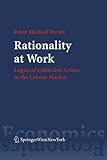Οι υπηρεσίες του Ο.ΜΕ.Δ. παρέχονται στις συνδικαλιστικές οργανώσεις εργοδοτών και εργαζομένων καθώς και σε μεμονωμένους εργοδότες σε επίπεδο επιχείρησης που επιθυμούν να απευθυνθούν σε αυτόν. Μεταξύ των εργοδοτών συγκαταλέγεται και το Ελληνικό Δημόσιο, για τους εργαζόμενους με σχέση εργασίας ιδιωτικού δικαίου στις Δημόσιες υπηρεσίες, Ν.Π.Δ.Δ. και Ο.Τ.Α.
Rationality at work : logics of collective action in the labour market / Peter Michael Doralt
Τύπος υλικού: ΚείμενοΛεπτομέρειες δημοσίευσης: Wien : Springer, 2005Περιγραφή: 275σ. : διαγ. ; 2005ISBN:
ΚείμενοΛεπτομέρειες δημοσίευσης: Wien : Springer, 2005Περιγραφή: 275σ. : διαγ. ; 2005ISBN: - 3211245413
- 331.89 21 εκδ.
- 13.06.5
| Τύπος τεκμηρίου | Τρέχουσα βιβλιοθήκη | Συλλογή | Ταξιθετικός αριθμός | Αριθμός αντιτύπου | Κατάσταση | Ημερομηνία λήξης | Barcode | |
|---|---|---|---|---|---|---|---|---|
 Books
Books
|
Βιβλιοθήκη ΟΜΕΔ Βιβλιοθήκη | Κύρια Συλλογή | 331.89 DOR (Περιήγηση στο ράφι(Άνοιγμα παρακάτω)) | 1 | Δανεισμένο | 29/07/2024 | 031000000944 |
Wage setting arrangements are widely seen as key ingredients to macro- economic success. Examining their micro- foundations is an urgent task. Drawing on treasure chest of empirical insights amassed by other social scientists, this ground- breaking book argues that economists have neglected the institutional underpinning of wage bargaining at their peril. Starting from Olson's insight that workers and firms often fail to pursue their collective interests, the book explains how self- reinforcing effects can promote group action- and how this contributed to the shifts in fortune of countries such as Sweden, Ireland, and Austria. This book should cause heated scholarly debates. But it assumes no prior knowledge and is highly readable. A short forewold, largely self- contained chapters and glossary make it easy to navigate. The tools it presents will prove usefull to scholars, practitioners, policy- makers or indeed anyone interested in the economic effects of unions and employer associations.
Δεν υπάρχουν σχόλια για αυτό τον τίτλο.

